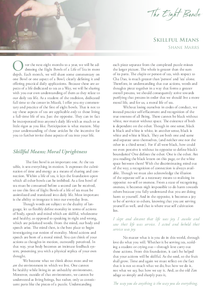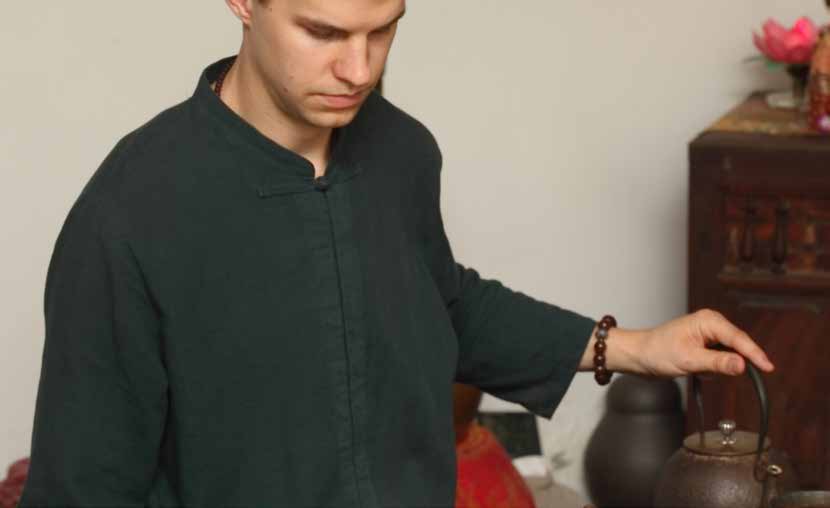
 |
|

Over the next eight months to a year, we will be addressing the Eight Bowls of a Life of Tea in more depth. Each month, we will share some commentary on one Bowl or one aspect of a Bowl, clearly defining it and offering practical daily applications. Because these are aspects of a life dedicated to tea as a Way, we will be sharing with you our own understanding of them as they relate to our daily tea life. As a student of the tradition, dedicated full time to the center in Miaoli, I offer you my commentary and practice of the first of eight bowls. That is not to say these aspects of tea are applicable only to those living a full-time life of tea. Just the opposite. They can in fact be incorporated into anyone's daily life with as much or as little rigor as you like. Participation is what matters. May your understanding of these articles be the incentive for you to further invite these aspects of tea into your life.
The first bowl is an important one. At the tea table, it sets everything in motion. It expresses the culmination of time and energy as a means of sharing and connection. Within a life of tea, it lays the foundation upon which all other bowls can be imbibed. As a first bowl of tea must be consumed before a second can be received, so too this first of Eight Bowls of a life of tea must be assimilated and translated into daily life. Most important is the ability to integrate it into our everyday lives.
Though words are subject to the duality of language, let us flexibly define morality in terms of actions of body, speech and mind which are skillful, wholesome and healthy, as opposed to speaking in right and wrong, which are polarized words. From the mind, our body and speech arise. The mind then, is the best place to begin investigating our notion of morality. Moral actions and speech are born of a moral mind. You can think of your actions as thoughts in motion, outwardly perceived. In that way, your body becomes an intimate feedback system, presenting you with a physical replica of your own thought.
We become what we think about most and we are the environment in which we live. One cannot be healthy while living in an unhealthy environment. Moreover, outside of that environment, we cannot be understood as living beings, but rather, only as constituent parts like the pieces of a puzzle. Understanding each piece separate from the completed puzzle misses the larger picture. The whole is greater than the sum of its parts. The chajin or person of tea, with respect to Cha Dao, is much greater than 'person' and 'tea' alone. Therefore, in understanding that our actions, words and thoughts piece together in a way that forms a greater overall process, we should consequently strive towards purifying that process in order that we should live a more moral life, and for us, a moral life of tea.
Without losing ourselves in codes of conduct, we instead practice self-effacement and recognition of the true oneness of all Being. There cannot be black without white, nor matter without space. The existence of both is dependent on the other. Though in one sense, black is black and white is white, in another sense, black is white and white is black. They are both one and same and separate unto themselves, (and neither one nor the other in a third sense). For if all were black, how could we even perceive it without its opposite to define black's boundaries? One defines the other. One is the other. Are you reading the black letters on this page, or the white space between them? With the discriminating mind out of the way, a recognition of connection is always available. Though we must also acknowledge the illusion of the separate self as a necessary means to realizing its opposite: no-self or oneness. From a state of recognizing oneness, it becomes nigh impossible to do harm towards others because you fully understand that you are doing harm to yourself. And in the opposite, it becomes a joy to be of service to others, knowing that you are serving yourself as well, and that is where true self cultivation lies.
I slept and dreamt that life was joy. I awoke and saw that life was service. I acted and beheld that service was joy.
No matter what it is you do in this world, through love do what you will. Whether it be serving tea, scolding a student or crying out - through love carry out these actions. From this foundation, it can't be helped that your actions will be skillful. As the seed, so the fruit shall grow. Time and again we must reflect on the fact that it is not so much what we do, but how we do it, not what we say, but how we say it. And, as the old Zen adage so simply and sharply puts it,
The way you do anything is the way you do everything.
The intention behind our action is more important than the action itself. A poor quality tea served with the greatest intention will always be better than the best quality tea served with the worst of intentions. How you store your tea, treat your teaware, design and rotate your chaxi, says everything about your approach to tea. Purify the mind, cultivate love and let that guide your intentions. Your thoughts, actions and speech will follow suit.
Love and do what thy will.
If you find in your life, abundance, health, laughter, compassion, strength, mental clarity, smiles on the faces of those you meet, then take it for granted that your actions are skillful. Inviting moral uprightness into your life isn't really about what you want, but being aware of what wants to happen through you, and then finally, making space for that to happen. On any given day at any given time, you can always ask yourself if what you are doing is skillful, wholesome or healthy. You will have to use your own understanding of these words while also being open to letting go of that understanding, adapting it, or adopting anew.
I have steadily endeavored to keep my mind free so as to give up any hypothesis however much beloved, as soon as facts are shown to be opposed to it. Indeed I have had no choice but to act in this manner.
When I asked myself how I make space in my life for skillful means and moral uprightness to act through me, I found myself reflecting on very small daily activities. It's the small things that count when incorporating moral uprightness into your life; how you sit and read; how you place your shoes down; how you close the door behind you; how you lift your kettle of water. The list goes on. These very subtle examples, which abound in our lives, yield an amplified effect when done with intention and awareness. Every moment is alive and pregnant with the opportunity to engage in presence and mindfulness.
There is always an opportunity to remember that everyday life is Zen (though Zen is not everyday life). You will probably spend more time in your life carrying out so-called "mundane" tasks, like tying your shoes and brushing your teeth, than so-called "sacred" ones, like seated meditation and prayer. If you want to be more morally upright, expand your definition of moral uprightness to encompass a larger picture. Don't just increase the frequency of one activity, but rather, increase the range of activities in which to apply skillful actions of body, mind and speech. Can you brush your teeth with presence and attention, just as you might while brewing tea? Or is it just a means of getting to bed? These "mundane" activities which make up most of our lives provide all the fuel necessary to practice skillful means. Find the sacred in the mundane.
Cultivate love and presence through any of the innumerable methods. Translate them into your daily life. Continue to ask yourself how you can be more moral, i.e., more skillful in all aspects of daily life. Is what you are doing and how you are doing it of benefit to others? To answer such questions, you must know yourself. And, in knowing yourself, you are partaking of the first Bowl of a Life of Tea.

